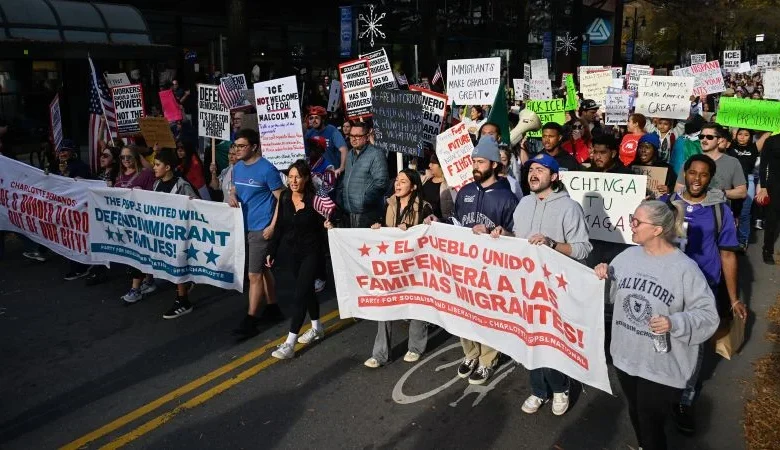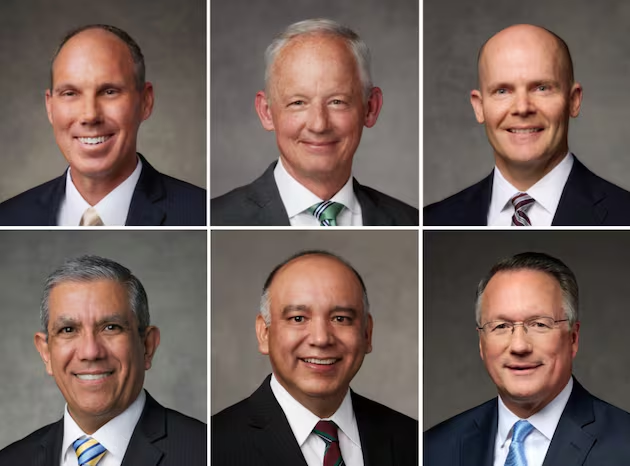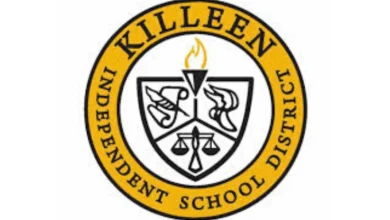Charlotte is the latest stop on DHS’ immigration blitz. Locals don’t understand why

Charlotte, North Carolina
—
With dozens of people arrested in North Carolina’s largest city during the Department of Homeland Security’s latest targeted immigration blitz, one question has emerged for many of its residents and leaders: Why Charlotte?
The city hadn’t been previously publicly singled out as an enhanced immigration enforcement target by the Trump administration in the same way as other cities like Chicago and Los Angeles. It’s a Democrat-led city, but it’s hundreds of miles away from either the northern or southern border. And crime has dropped 8% from last year, with violent crimes down 20%, according to data released by the city in October.
Before it even started, the announcement that an immigration enforcement operation would arrive in Charlotte – right off the heels of a weekslong operation that led to hundreds of arrests and fierce protests in Chicago – provoked fear and anxiety in the city.
Democratic leaders in Charlotte have largely framed the operation – which came as a surprise to local officials – as a political distraction ahead of next year’s midterm elections.
“This administration ran on rhetoric that is anti-immigrant to score political points,” said City Council member Dimple Ajmera, a Democrat. “We have a very important US Senate race in 2026 coming up. And they want to score political points and use fear to divide our community.”
Democrats are hoping to flip one of North Carolina’s Senate seats after Republican incumbent Sen. Thom Tillis pulled out of the race following criticism from the president who threatened to back a primary challenger to Tillis’ seat. Former North Carolina Gov. Roy Cooper, who is widely popular across the state, launched his campaign in July.
Similarly, state Sen. Caleb Theodros, a Democrat, characterized the operation as a Republican political stunt. “The truth is, this move from the federal government, and the silence from GOP state leaders enabling it, are part of the same political distraction,” he said in a statement to CNN. “They’re trying to shift attention away from their own failures, because they have no plan to lower costs, make housing affordable, or expand real opportunity for working people.”
The Department of Homeland Security said in a statement the surge would “target the criminal illegal aliens who flocked to the Tar Heel State because they knew sanctuary politicians would protect them and allow them to roam free on American streets.”
The agency claimed “nearly 1,400 detainers across North Carolina have not been honored – releasing criminal illegal aliens into North Carolina’s neighborhoods.” Charlotte is not a “sanctuary city,” but it is a “Certified Welcoming City,” a designation for cities with commitments to immigrant inclusion.
Immigration into the city has increased in recent years. Around 18.2% of the city’s population was foreign-born in 2023, according to US Census data, around double that of North Carolina at large. And there have been disagreements in the city in the past about immigration enforcement. Mecklenburg County Sheriff Garry McFadden ended the county’s decadelong 287(g) partnership with ICE in 2018, to the chagrin of Republican officials.
The city became a lightning rod for debates about policing and public safety in Democrat-led cities in September, after a 23-year-old Ukrainian refugee was stabbed to death on Charlotte public transit by a man with a lengthy history of arrests and mental health problems.
Though the suspect arrested in that case is a US citizen, President Donald Trump seized on the killing as an example of what he framed as out-of-control crime, and he pledged to send the National Guard to blue cities across the country. Three Republican members of the state’s congressional delegation, who represent districts around Charlotte, asked the governor earlier this month to deploy the Guard to fight crime.
Top Border Patrol official Gregory Bovino, who is from North Carolina, has his own answer. In an Instagram post with a photo of a man he claimed was an “illegal alien with a violent criminal history,” he wrote, “This is why border security matters. This is why we’re in Charlotte.”
Border Patrol agents arrested 81 people in Charlotte on Saturday, Bovino said Sunday, in an operation DHS dubbed “Charlotte’s Web.” He didn’t specify the reasons for the arrests or the names of those arrested but said many had “significant criminal and immigration history.”
Bovino – who was criticized by a federal judge over his and his agents’ use of force in Chicago – was spotted on video during the detainment of a person outside a grocery store in Pineville, around 10 miles south of Charlotte.
A man with a REAL ID who says he became a US citizen in 2019 was caught in the fray. Federal agents smashed the car window of Willy Wender Aceituno Medina, a Honduran immigrant who lives in Charlotte, and then detained him before letting him go a little while later. Medina said he pleaded with federal agents to look at his ID after the arrest.
In a statement to CNN, a Customs and Border Patrol agent said that officers had “approached an individual who acted increasingly erratic. The individual escalated the situation and refused to comply to lawful commands by officers.”
Mayor Pro Tem Danté Anderson, in a Saturday interview with CNN, said there’s “fear and anxiety rampant” across the city.
The Carolina Migrant Network, a legal advocacy nonprofit, said it had seen federal agents in “camouflage and tactical gear operating out of unmarked vehicles” – a sight that has become characteristic of DHS’ operations across the country.
“We have also witnessed an escalation in hostile actions, including the arrest of U.S. citizens, physical assaults on community members, and the disruption of places of worship, businesses, and restaurants where people have been questioned about their immigration status,” said the group in a statement.
DHS did not respond to questions about the nonprofit’s claims but sent CNN a statement including the photos and names of people it said were immigrants with criminal histories released in North Carolina.
Protesters decrying the operation filled a Charlotte park Saturday, then marched through the streets of uptown.
Several businesses closed temporarily in the wake of the announced operation, among them a popular Colombian bakery that had closed its doors only once in the past 28 years.
Manuel “Manolo” Betancur closed his family bakery Saturday after men in green uniforms chased and tackled people outside the shop, he told CNN. He said he isn’t sure when he will reopen.
The officers emerged from unmarked SUVs Saturday morning, “jumping and taking people down in the street, just people that look like me,” Betancur said. He is a naturalized US citizen and said he’s started carrying his passport with him everywhere he goes, “because I don’t want to go through the trouble. I promised my wife and my kids I’m going to be back home tonight.”
Betancur said he doesn’t want his customers to risk a similar encounter with federal agents – not when they’re just trying to buy cakes or pastries.
A company that manages several bars and restaurants in Charlotte said it closed its properties Saturday night after DHS’s announcement. Dubai Nightlife Charlotte cited the “safety, peace of mind and protection of those who visit us” in making the “preventative” decision, according to a Facebook post in Spanish.
The Colombian American Chamber of Commerce of the Carolinas also announced it was postponing an event scheduled for Saturday “due to recent action to bolster immigration operations in several cities across the country.”
The announcement that Charlotte would be the next city targeted by federal immigration officials was unexpected – including for local government.
None of the Charlotte officials CNN reached out to Tuesday or Wednesday about the reported move said they were aware of the plan.
City Council member Malcolm Graham, who said he was unaware of the planned operation before CNN called him, said, “It’s just part and parcel of how this administration conducts itself. You learn things through tweets and media reports, no direct communication from anyone in authority. That, for me, is frustrating.”
It wasn’t until Thursday afternoon that a Charlotte official confirmed for the first time they had spoken with federal officials about the plans. McFadden said Thursday afternoon two federal officials contacted him about the arrival of Border Patrol agents but said details on the federal operation had not been shared with the sheriff’s office and they have not been asked to assist with any enforcement actions.
Even the operation’s name has attracted controversy: Martha White, the granddaughter of “Charlotte’s Web” author E.B. White and his literary executor, decried it as an attempt to ride the beloved children book’s “coattails without permission” in a statement to CNN. Her grandfather, she said, “certainly didn’t believe in masked men, in unmarked cars, raiding people’s homes and workplaces without IDs or summons.”
North Carolina Gov. Josh Stein noted in a statement on social media that Border Patrol has detained many people without criminal histories in Chicago. He urged residents to use their phones to record “if you see something bad happening.”
“Local law enforcement will be here protecting the people of this state long after these federal agents go on to the next place,” he said.
Stefanía Arteaga, co-founder of the Carolina Migrant Network, suggested Charlotte’s growing immigrant population as a possible reason the city is being targeted. The city is home to Charlotte Immigration Court and a large ICE field office, she said. The move could also be seen as “retaliation” for the sheriff’s decision to end collaboration with ICE, she said.
“I think there’s a level of, ‘let’s add another city to a roster, create some havoc, and move on’ as well,” she said.
Some of the state and city’s Republicans, meanwhile, have welcomed the surge.
“We’re grateful to see these brave men and women in federal law enforcement following through on President Trump’s promise to remove violent criminal illegals from our country and those stoking fear about these targeted operations must stop at once,” NCGOP Communications Director Matt Mercer said in a statement.
Kyle Kirby, the chair of Mecklenburg County’s GOP, told CNN he believed Charlotte was targeted because of its large immigration court and the sheriff’s refusal to work with ICE. “When local leaders release individuals flagged for federal pickup back into the community, it simply forces federal agencies to step in,” he said.
At least one Republican had more mixed feelings. Ed Driggs, who, after Democrats flipped a seat in this month’s election, will be the lone Republican on Charlotte’s City Council next year, said early in the week he was surprised to learn it was Border Patrol being sent to Charlotte.
“I’m conflicted. I have a hard line on identifying and deporting illegal immigrants who commit crimes, but I’m not sure this is the way to do it,” said Driggs. “That’s the right thing to do, deport violent criminals. But they are running over local government and it’s causing concern from legal people, legal Americans and legal immigrants.”
Driggs said if there were more local coordination ahead of time – instead of finding out through “anonymous media sources” – the Border Patrol operation may not have been met with such initial fear and confusion from the city’s residents.
“The involvement of people who are elected locally gives residents, legal residents, comfort. Otherwise this could feel like an invasion.”
Bovino’s crackdown on immigration is expected to continue apace in other Democrat-led cities after Charlotte.
The next stop: New Orleans, according to two US officials familiar with the planning.
The president has talked about sending the National Guard to New Orleans, a Democrat-led city in a Republican-led state, as far back as September. He said the city has a “crime problem.” But the National Guard plan hasn’t materialized, as efforts to deploy the National Guard in Chicago and Portland have largely been stymied by the courts.
Neither have the president’s ideas to send troops to Baltimore and New York.
The New Orleans mayor’s office has not responded to CNN’s outreach about possible future Border Patrol operations there.
Speaking to Fox News on Thursday from West Virginia – before the Charlotte operation was officially announced – Bovino floated a few cities that Border Patrol could head to next.
“You’re going to see us redeploy to – it could be New York, it could be Chicago, it could be Charlotte.”





